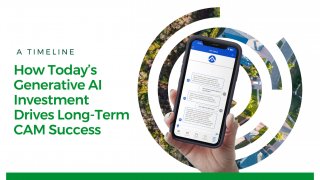- August 19, 2024
- CINC Systems

Tell us you work in association management without telling us you work in association management. We’ll start. When you’re a CAM company or manager, summer isn’t exactly the season of relaxation it’s cracked up to be. That’s because it’s pool season and peak violation season. As homeowners take off for summer vacation, host outdoor parties, and keep their new boats in the driveway, managers must ensure they still maintain their lawns, comply with noise ordinances, and follow parking rules, among many other things.
More citations means more questions and frustration from both homeowners and managers. However, with the right tools, CAM companies can increase transparency around the associations’ rules, streamline the violation process, and ease tensions. Here’s how.
Make bylaws accessible and easy to understand.
How often have you heard things like, “I didn’t realize my landscaping was breaking the rules”? It sounds like a common excuse to get out of a fine, but there’s truth in it for many homeowners. Most don’t take the time to read through covenants and bylaws, and the legalese can be complicated to understand. Often, the first time they learn about a rule is after they receive a violation notice.
Cephai, the first true generative AI platform built for the community association management industry, can process and interpret community rules for homeowners and provide immediate answers to their questions within the CINC Homeowner app, like:
“How often do I need to mow my lawn?”
“What time does the noise ordinance go into effect?”
“Can I park my boat in the driveway?”
“How high can my privacy shrubs be?”
Streamline the citation process.
Clear, consistent processes help ensure that violations are fairly and evenly applied, well documented, and issued lawfully. With the CINC Homeowner and Manager apps, the process is seamless.
Step 1: During their rounds, the community manager notes the address of each violation. They can issue notices or friendly reminders and upload photos.
Step 2: The homeowner receives a notification in the Homeowner app under “My Violations.”
Step 3: The homeowner can alert the manager when they’ve resolved the issue by adding notes and photos. If the problem is not resolved, the fee shows up in the homeowner’s balance within the app, which they can quickly pay on any device.
Outsource the leg work more efficiently.
CAM companies that use third-party vendors to identify violations and issue notices can provide access to the manager app, removing unnecessary steps and creating less room for error. Now, everything is documented in one place for all parties to access.
With fewer hours spent answering covenant questions, documenting violations, following up with homeowners, and managing third parties, managers have more time to focus on impactful tasks that strengthen their relationship with their community, like engaging and educating boards. Take a tour of all of CINC’s homeowner solutions here!
Related Reads

Blog
Unlocking Manager Potential: How Cephai in CINC Manager Frees Up Time for Engagement
- November 22, 2024

Blog
Keeping Calm and Carrying On: Leadership Tips for Turbulent Times
- November 20, 2024

Blog
AI at Bat: What Umpires, Baseball, and Data Security Can Teach Us About AI Risks
- October 28, 2024

Blog
Do I really need a homeowner app when I have a mobile-friendly website?
- October 14, 2024

Blog
Weathering the Storm: How to Adapt to Soaring HOA Insurance Costs
- October 1, 2024

Blog
How Today’s Generative AI Investment Drives Long-Term CAM Success: A Timeline
- September 16, 2024
